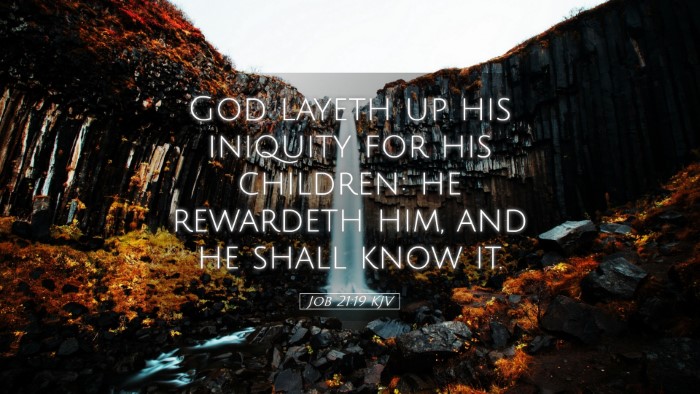Commentary on Job 21:19
Job 21:19 states, "God lays up his iniquity for his children." This verse is part of Job's discourse on the seeming prosperity of the wicked and the apparent injustice in the world, a theme that resonates throughout the book of Job. Below, we present summarizations and insights from respected public domain commentaries.
1. Contextual Background
The book of Job is a poetic and philosophical exploration of suffering and divine justice. Job, a righteous man, faces immense suffering, leading him to question the traditional beliefs about retribution. This verse is part of a largerargument where Job asserts that the wicked often appear to prosper, suggesting that their punishment may be deferred to their children instead.
2. Insights from Commentators
-
Matthew Henry:
Henry interprets this verse as Job's reflection on the common belief that wickedness leads to immediate punishment. He argues that Job challenges this notion by observing that the children of the wicked often inherit their wealth and prosperity, raising questions about divine justice. Henry emphasizes that sometimes the retribution may not manifest until later generations, suggesting a broader scope of God's judgment.
-
Albert Barnes:
Barnes draws attention to the phrasing of the verse and suggests it highlights the idea of accumulated sinfulness being visited upon children. He elaborates on the cultural understanding of the ancient Near East, where familial ties were strong, and the consequences of one's actions could impact one's descendants. Here, Barnes takes a nuanced approach by arguing for God’s overarching justice that may not align with human understanding.
-
Adam Clarke:
Clarke offers a historical examination of the verse, noting that the concept of inherited sin was prevalent in Job's time. He asserts that Job’s statement is not a literal teaching but rather his expression of frustration with the situation he observes. Clarke indicates that every individual is accountable for their own sins, and the notion of iniquity against children necessitates careful theological interpretation to avoid misconstruing God’s justice.
3. Theological Implications
This verse raises fundamental questions about the nature of God’s justice and the moral universe. The implications are significant for understanding how sin affects individuals and families:
-
Generational Consequences:
Job’s assertion speaks to the reality that the actions of parents can have lasting impacts on their children, encouraging a reflection on personal responsibility and the communal nature of sin.
-
The Nature of Divine Justice:
The commentary on this verse prompts inquiries into how and when God administers justice. It suggests that human perspectives on justice are often limited and that God's timing is different than our expectation.
-
The Experience of the Righteous:
Job's lament serves as a voice for many faithful believers who witness the prosperity of the wicked. It invites a deeper understanding of suffering and the character of God amidst trials, challenging believers to remain steadfast despite observable injustices.
4. Conclusion
Job 21:19 remains a powerful verse that encapsulates the struggle between faith and experience regarding justice. The insights provided by Matthew Henry, Albert Barnes, and Adam Clarke enrich our understanding of this passage, urging readers—pastors, students, theologians, and scholars alike—to engage with the complexities of divine justice and the ramifications of human action.


